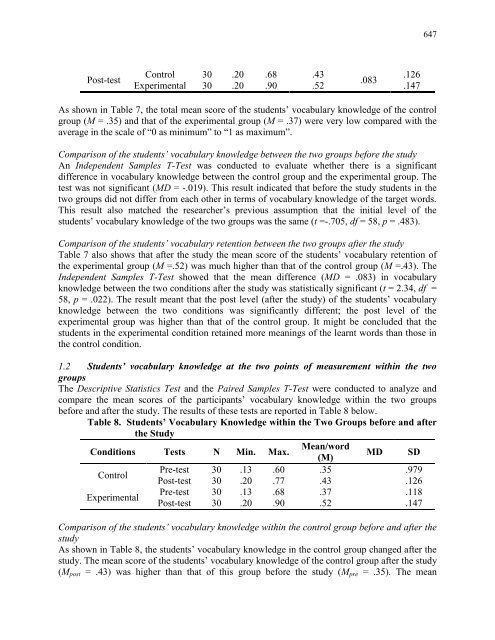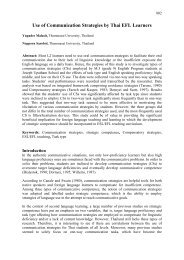The Effects of Semantic Mapping on Vocabulary Memorizing
The Effects of Semantic Mapping on Vocabulary Memorizing
The Effects of Semantic Mapping on Vocabulary Memorizing
You also want an ePaper? Increase the reach of your titles
YUMPU automatically turns print PDFs into web optimized ePapers that Google loves.
Post-test<br />
C<strong>on</strong>trol 30 .20 .68 .43<br />
.126<br />
.083<br />
Experimental 30 .20 .90 .52 .147<br />
As shown in Table 7, the total mean score <str<strong>on</strong>g>of</str<strong>on</strong>g> the students’ vocabulary knowledge <str<strong>on</strong>g>of</str<strong>on</strong>g> the c<strong>on</strong>trol<br />
group (M = .35) and that <str<strong>on</strong>g>of</str<strong>on</strong>g> the experimental group (M = .37) were very low compared with the<br />
average in the scale <str<strong>on</strong>g>of</str<strong>on</strong>g> “0 as minimum” to “1 as maximum”.<br />
Comparis<strong>on</strong> <str<strong>on</strong>g>of</str<strong>on</strong>g> the students’ vocabulary knowledge between the two groups before the study<br />
An Independent Samples T-Test was c<strong>on</strong>ducted to evaluate whether there is a significant<br />
difference in vocabulary knowledge between the c<strong>on</strong>trol group and the experimental group. <str<strong>on</strong>g>The</str<strong>on</strong>g><br />
test was not significant (MD = -.019). This result indicated that before the study students in the<br />
two groups did not differ from each other in terms <str<strong>on</strong>g>of</str<strong>on</strong>g> vocabulary knowledge <str<strong>on</strong>g>of</str<strong>on</strong>g> the target words.<br />
This result also matched the researcher’s previous assumpti<strong>on</strong> that the initial level <str<strong>on</strong>g>of</str<strong>on</strong>g> the<br />
students’ vocabulary knowledge <str<strong>on</strong>g>of</str<strong>on</strong>g> the two groups was the same (t =-.705, df = 58, p = .483).<br />
Comparis<strong>on</strong> <str<strong>on</strong>g>of</str<strong>on</strong>g> the students’ vocabulary retenti<strong>on</strong> between the two groups after the study<br />
Table 7 also shows that after the study the mean score <str<strong>on</strong>g>of</str<strong>on</strong>g> the students’ vocabulary retenti<strong>on</strong> <str<strong>on</strong>g>of</str<strong>on</strong>g><br />
the experimental group (M =.52) was much higher than that <str<strong>on</strong>g>of</str<strong>on</strong>g> the c<strong>on</strong>trol group (M =.43). <str<strong>on</strong>g>The</str<strong>on</strong>g><br />
Independent Samples T-Test showed that the mean difference (MD = .083) in vocabulary<br />
knowledge between the two c<strong>on</strong>diti<strong>on</strong>s after the study was statistically significant (t = 2.34, df =<br />
58, p = .022). <str<strong>on</strong>g>The</str<strong>on</strong>g> result meant that the post level (after the study) <str<strong>on</strong>g>of</str<strong>on</strong>g> the students’ vocabulary<br />
knowledge between the two c<strong>on</strong>diti<strong>on</strong>s was significantly different; the post level <str<strong>on</strong>g>of</str<strong>on</strong>g> the<br />
experimental group was higher than that <str<strong>on</strong>g>of</str<strong>on</strong>g> the c<strong>on</strong>trol group. It might be c<strong>on</strong>cluded that the<br />
students in the experimental c<strong>on</strong>diti<strong>on</strong> retained more meanings <str<strong>on</strong>g>of</str<strong>on</strong>g> the learnt words than those in<br />
the c<strong>on</strong>trol c<strong>on</strong>diti<strong>on</strong>.<br />
1.2 Students’ vocabulary knowledge at the two points <str<strong>on</strong>g>of</str<strong>on</strong>g> measurement within the two<br />
groups<br />
<str<strong>on</strong>g>The</str<strong>on</strong>g> Descriptive Statistics Test and the Paired Samples T-Test were c<strong>on</strong>ducted to analyze and<br />
compare the mean scores <str<strong>on</strong>g>of</str<strong>on</strong>g> the participants’ vocabulary knowledge within the two groups<br />
before and after the study. <str<strong>on</strong>g>The</str<strong>on</strong>g> results <str<strong>on</strong>g>of</str<strong>on</strong>g> these tests are reported in Table 8 below.<br />
Table 8. Students’ <strong>Vocabulary</strong> Knowledge within the Two Groups before and after<br />
the Study<br />
C<strong>on</strong>diti<strong>on</strong>s Tests N Min. Max. Mean/word<br />
(M)<br />
MD SD<br />
C<strong>on</strong>trol<br />
Pre-test<br />
Post-test<br />
30<br />
30<br />
.13<br />
.20<br />
.60<br />
.77<br />
.35<br />
.43<br />
.979<br />
.126<br />
Experimental<br />
Pre-test<br />
Post-test<br />
30<br />
30<br />
.13<br />
.20<br />
.68<br />
.90<br />
.37<br />
.52<br />
.118<br />
.147<br />
Comparis<strong>on</strong> <str<strong>on</strong>g>of</str<strong>on</strong>g> the students’ vocabulary knowledge within the c<strong>on</strong>trol group before and after the<br />
study<br />
As shown in Table 8, the students’ vocabulary knowledge in the c<strong>on</strong>trol group changed after the<br />
study. <str<strong>on</strong>g>The</str<strong>on</strong>g> mean score <str<strong>on</strong>g>of</str<strong>on</strong>g> the students’ vocabulary knowledge <str<strong>on</strong>g>of</str<strong>on</strong>g> the c<strong>on</strong>trol group after the study<br />
(Mpost = .43) was higher than that <str<strong>on</strong>g>of</str<strong>on</strong>g> this group before the study (Mpre = .35). <str<strong>on</strong>g>The</str<strong>on</strong>g> mean<br />
647






